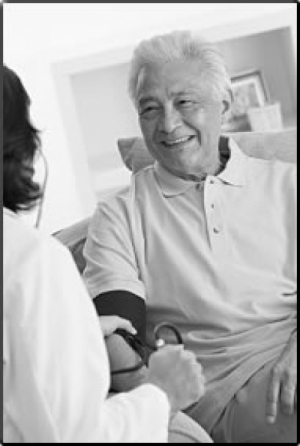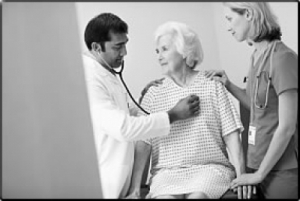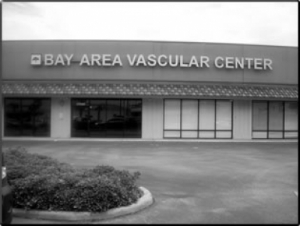FDI Creative Services
Dialysis — Hemodialysis, Peritoneal Dialysis, Nocturnal Dialysis and Home Hemodialysis
People with chronic kidney disease (CKD) can progress to kidney failure, also known as end stage renal disease (ESRD). At this stage, overall kidney function is not adequate to maintain your health and life. Treating ESRD requires renal replacement therapy, including dialysis or transplantation. Your nephrologist will help you choose the right type of dialysis for you – hemodialysis, peritoneal dialysis, nocturnal dialysis or home hemodialysis.
Hemodialysis
Hemodialysis is a process of removing waste products, chemical substances and extra fluid from your body through an artificial kidney (dialyzer). This type of dialysis is usually done three times per week at a specialized dialysis center. Each dialysis session takes an average of four hours. Hemodialysis requires an ”access” to get your blood cleaned. This access may be a fistula, graft, or dialysis catheter.
- A fistula is created by joining an artery to a vein under the skin of your arm and is the preferred type of access.
- A graft is created if your blood vessels are not adequate for a fistula, and uses a small plastic tube to join an artery and vein under your skin.
- A hemodialysis catheter may also be needed until a permanent access can be used. A catheter is a narrow, plastic tube that is inserted in a large neck vein and is used temporarily.
Please note: Renal Specialists of Houston physicians serve as medical directors for dialysis centers all over the Houston metropolitan area. We will arrange dialysis treatments at the center that is most convenient for you.
Nocturnal Dialysis
Nocturnal dialysis is a version of hemodialysis that is done overnight at the dialysis unit. Instead of a typical four-hour treatment, nocturnal hemodialysis patients receive seven-to-eight hours of dialysis three times each week. This longer version provides additional blood cleaning and is more like normal renal function. Often, nocturnal dialysis patients are able to use less of their medications and report feeling better overall. Nocturnal dialysis requires the use of a permanent access like a fistula or graft.
Home Hemodialysis
Home hemodialysis is simply what it implies. It is another version of hemodialysis that allows the patient to receive hemodialysis treatment at home. This often requires intensive training and the assistance of a designated caregiver.
Peritoneal Dialysis
Peritoneal dialysis is similar to hemodialysis – it is a process of removing waste products, chemical substances and extra fluid from your body. It is different because it uses a catheter inserted into your abdomen (peritoneum) as the access. During the treatment or exchange, about two quarts of fluid, called dialysate, runs into your abdomen through the catheter and remains there for three to five hours. It is then drained out. This drained fluid takes the waste products and extra water from your blood. Peritoneal dialysis is done seven days a week at your home. There are two types of peritoneal dialysis: Continuous Ambulatory Peritoneal Dialysis (CAPD) and Continuous Cyclic Peritoneal Dialysis (CCPD).
Can dialysis help cure kidney disease?
Unfortunately, no. Dialysis does some of the work of healthy kidneys, but it does not cure your kidney disease. You will continue to need dialysis treatments unless you receive a kidney transplant.
Chronic Kidney Disease Management
Chronic kidney disease (CKD) affects more than 26 million Americans. Millions more are at risk due to diabetes and high blood pressure. CKD often has no early symptoms, so it’s important to be screened by your primary care physician and begin treatment early.
Ask your primary care doctor for a referral to Renal Specialists of Houston. We will help you manage your CKD to maintain good health and slow the progression of kidney disease. Our goal is to decrease the risk of complications and end-stage renal disease (ESRD). Our multidisciplinary team works toward these CKD treatment goals:
- Slow the progression of kidney disease
- Preserve the remaining kidney function
- Control high blood pressure
- Recommend nutrition guidelines and appropriate physical activity
- Manage anemia
- Prevent bone disease related to CKD
- Treat acidosis
- Encourage regular follow-ups with your primary care physician and nephrologist
- Review medications
- Consider renal replacement therapy (dialysis or transplantation) when it becomes necessary
Outpatient Nephrology Consultation
Our outpatient service gives you the opportunity to see a kidney specialist, or nephrologist, at one of our 10 convenient office locations throughout Houston. Usually, your primary care physician or another healthcare provider will refer you to a nephrologist for decreased kidney function.
Our doctors will talk with you about your medical history, perform a physical exam and get appropriate blood work to help determine the cause of your decreased renal function. Renal Specialists nephrologists are available to evaluate all kidney-related issues, including:
- Chronic kidney disease (CKD)
- Glomerulonephritis
- Kidney stones
- Polycystic kidney disease
- Kidney transplant
Once a diagnosis has been established, our nephrologist will see you on a routine basis to continue your treatment plan. Our goal is to help you maintain good health, slow the progression of kidney disease and decrease the risk for complications of chronic kidney disease (CKD).
Inpatient Nephrology Consultation
During your hospital stay, your doctor, an attending physician or another specialist may consult a nephrologist, or kidney specialist, to provide additional recommendations.
- This consultation will include a medical history, physical exam and appropriate blood work to determine the cause of your kidney-related issues and to adequately treat your medical condition.
- Our nephrologists also will manage the care of dialysis patients who are admitted to the hospital for any issues.
- Our nephrologists will follow you on a routine basis while you are in the hospital and may ask you to follow up on an outpatient basis, as needed.
Bay Area Vascular Center
Renal Specialists of Houston's Bay Area Vascular Center (BAVC) is an outpatient procedure center dedicated to managing and maintaining our patients' hemodialysis access. Our goal is to provide prompt and convenient vascular access intervention. Staff at the center perform a variety of procedures to ensure a properly functioning access.
Houston (South) - map
8537 Gulf Freeway
Suite C
Houston, TX 77017
832.386.0900
Hospital Affiliations
Renal Specialists of Houston physicians are members of medical staffs of hospitals throughout the metropolitan area so that we can care for you in your neighborhood.
Clear Lake Regional Medical Center
500 Medical Center Blvd.
Webster, TX 77598
281-332-2511
HCA Pearland Medical Center
11100 Shadow Creek Pky
Pearland, TX 77584
713 770 7000
Kindred Clear Lake Rehabilitation Hospital
655 East Medical Center Blvd.
Webster, Texas 77598
281-286-1500
Kindred Hospital – Bay Area
4801 East Sam Houston Parkway South
Pasadena, TX 77505
281-991-5463
Patients Medical Center
4600 East Sam Houston Parkway South
Pasadena, Texas 77505
713-948-7000
Select Specialty Hospital – Houston Medical Center
2130 W. Holcombe
Houston, Texas 77030
713-218-2300
St. Luke’s Episcopal Hospital
6720 Bertner Ave.
Houston, TX 77030
832-355-1000
Dialysis Center Locations
Renal Specialists of Houston physicians serve as medical directors in dialysis centers throughout the Houston metropolitan area. If you need dialysis, we will schedule your care at a location convenient to you.
Office Locations
Caring for you where you live . . . in your neighborhood.
We not only manage your care, we also build relationships. Renal Specialists of Houston doctors are located in an office near you.
History
Renal Specialists of Houston, P.A. was founded in 1977 by Dr. Camilo Barcenas. With an office located in St. Luke's Episcopal Hospital, he set out to treat patients with compassion and superb expertise. He soon hired Dr. Whitson (Pete) Etheridge and Dr. Henry Muniz, and they began to extend the practice to the southeast quadrant of Houston. Dr. Sarah Shearer joined Renal Specialists in 1991.
Dr. Barcenas and Dr. Etheridge opened the first dialysis facility in Pasadena, and Dr. Muniz opened the first dialysis center in Clear Lake.
Today, there are 19 nephrologists in the practice, and Renal Specialists of Houston is one of the 10 largest nephrology practices in the United States. We have a multi-cultural group of physicians who believe in Dr. Barcenas' principle of excellent, compassionate care for patients.



































